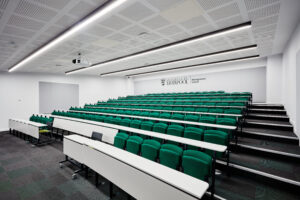How you'll learn
On our MSc Sports Business and Management, modules are taught using the latest active learning techniques. These include the use of real-world case studies from the world of professional sport, authentic assessment tasks that mimic sports organisation activities and requisite outputs, business scenario and negotiation simulations, use of interactive participation software, and lecture capture. We also ensure that each module has a distinctive contribution from an industry guest speaker, and host a broader “in conversation” series where C-suite executives from the sports industry contribute to engaging discussions with faculty and students.
The principal forms of teaching are lectures and seminars with lectures normally being supported by material such as hand-outs and presentations. Seminars allow for a more detailed discussion of a topic under the direction of a tutor. You are normally expected to prepare work in advance for seminars and may be expected to present work or give presentations.
Following semester two you will complete either a dissertation or the Strategic Business Research for Sport project with the support of an academic supervisor. This final project enables students to specialise in an area of the sports business discipline to deepen their knowledge, understanding and capabilities in this area.
Teaching time will account for an average of 10 hours per week and you should anticipate an additional 24 hours of self-directed study and group work per week.
How you're assessed
In semester one and two, you will take modules totalling 120 credits. The dissertation or research project completed during the summer period is worth 60 credits and students will be supported by their academic supervisor.
Students are required to complete 180 credits to achieve a full MSc.
Subject to meeting specific criteria outlined by the University, students will graduate with a Pass, Merit or Distinction.
Assessment tasks are varied and some may be designed specifically to meet the learning outcomes of a particular programme of study, but students can expect to be assessed via coursework, essay, group work, presentations, case studies, negotiation exercises, reports and examinations. The weighting of individual components will vary from one module to another. All assessment information is included within the module specification.
Liverpool Hallmarks
We have a distinctive approach to education, the Liverpool Curriculum Framework, which focuses on research-connected teaching, active learning, and authentic assessment to ensure our students graduate as digitally fluent and confident global citizens.
The Liverpool Curriculum framework sets out our distinctive approach to education. Our teaching staff support our students to develop academic knowledge, skills, and understanding alongside our graduate attributes:
- Digital fluency
- Confidence
- Global citizenship
Our curriculum is characterised by the three Liverpool Hallmarks:
- Research-connected teaching
- Active learning
- Authentic assessment
All this is underpinned by our core value of inclusivity and commitment to providing a curriculum that is accessible to all students.











